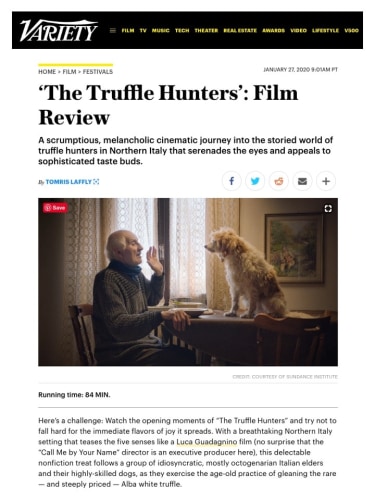‘The Truffle Hunters’: Film Review
Variety
01/27/2020
Back
By Tomris Laffly
A scrumptious, melancholic cinematic journey into the storied world of truffle hunters in Northern Italy that serenades the eyes and appeals to sophisticated taste buds.
Here’s a challenge: Watch the opening moments of “The Truffle Hunters” and try not to fall hard for the immediate flavors of joy it spreads. With a breathtaking Northern Italy setting that teases the five senses like a Luca Guadagnino film (no surprise that the “Call Me by Your Name” director is an executive producer here), this delectable nonfiction treat follows a group of idiosyncratic, mostly octogenarian Italian elders and their highly-skilled dogs, as they exercise the age-old practice of gleaning the rare — and steeply priced — Alba white truffle.
Like the gastronomic delicacy that can neither be replaced nor cultivated, the film (part of this year’s World Documentary Competition at Sundance) from co-directors Michael Dweck and Gregory Kershaw oozes a cinematic perfume both delightful and distinctive. Think of “The Truffle Hunters” this year’s “Honeyland,” the now double-Oscar-nominated picture about a fearless Macedonian beekeeper. After all, Dweck and Kershaw’s intimate portrait also supplies an adoring lens into the process and long-standing tradition of gathering one of nature’s greatest culinary gifts.
Through a luxuriant palette that demands to be savored (and distributed) on the big screen, the movie also honors the workings of an eccentric pastoral community, entrenched with the goodness of nature and animals. However, unlike “Honeyland” — which employs a more spur-of-the-moment and fluid mode to trace the life of its central heroine — “The Truffle Hunters” goes for a studious and staccato method. Fusing numerous painterly, layered and romantically lit single-frame shots together, the filmmakers create a sequence of mini episodes, while the human characters and their impossibly cute and clever dogs go on about their daily routine amid these scrumptious tableaux.
This unblinking and mannered approach births a certain unavoidable artificiality: The subjects often seem aware of the presence of a camera and they sure aim to please it. Still, the succession of the vignettes charms and disarms with an innocent and melancholic quality that will feel familiar to those who’ve seen photographer-turned-filmmaker Dweck’s 2018 documentary “The Last Race” (which Kershaw lensed), a loving tribute to a ramshackle racetrack in Long Island’s Riverhead. In that film, the existence of the heroic people Dweck followed (through a similarly deliberate set of shots) was endangered by capitalistic takeover.
Here, the livelihoods are also challenged, but with bigger scale (and not entirely unrelated) threats. The multi-pronged danger that gloomily hangs over the entirety of “The Truffle Hunters” goes like this: climate change dries up the soil, taking away a main lifeline from the truffles that miraculously grows in tree roots. Also in the mix of problems that keep dedicated but aging hunters on their toes are deforestation, countrywide economic struggles and relentless competition.
Still, the filmmakers refuse to surrender to a doom-and-gloom story, and instead lead us into the secretive dealings of a group of truffle devotees who navigate these challenges with humor, compassion and optimism. Among them are Aurelio and his faithful four-legged pal Birba, who might as well be the old man’s daughter. In one of the film’s sweetest scenes, the avid hunter sits across from Birba around a kitchen table, sharing with her both his food and greatest fears for the future: Who is going to take care of Birba when he’s gone? Then there is the passionate forager Carlo — so stubborn that he ignores his wife’s concerned warnings and sneaks out at night to hunt for truffles with a flashlight and his canine partner-in-crime, Titina. There’s also the tireless and talkative Sergio, who veers into the woods daily with his two gifted sniffers Pepe and Fiona. No longer a hunter due to environmental concerns and pressures of rivalry, the poetic, stylishly attired Angelo offers viewers a big-picture look into the endangered art and science of truffle hunting. Meanwhile, his ambitious cousin Egidio strives to lead the way toward innovation, believing that he could cultivate white truffles, or at least improve the conditions to yield better crops.
Surrounding them is an intricate chain of business machinery — so vast and far-reaching that it’s easy to forget only a handful of aficionados around Piedmont hold the key to the produce that makes it run. Sometimes they go to hilarious lengths to keep their stealthy family secrets to themselves and mislead their desperate adversaries.
Buried underneath the picture (and vaguely hinted at by the filmmakers) is also a sharp divergence in socioeconomic class between the hunters and their increasingly scarce product’s end users, who pay a small fortune to enjoy shaved truffles in fancy restaurants. It’s a complex picture that Dweck and Kershaw navigate with respect, curiosity and a sense of awe, managing to excavate the essence of a tight-knit, lovably atypical commune out of it. Upon seeing “The Truffle Hunters,” don’t be surprised if you start seeing the elusive ingredient sprinkled over your risotto in spiritual terms.
'The Truffle Hunters': Film Review
Reviewed at Dolby 24, New York, Jan. 16, 2020. (In Sundance Film Festival.) Running time: 84 MIN.
CREW: Director: Michael Dweck, Gregory Kershaw. Editor: Charlotte Munch Bengtsen. Music: Ed Côrtes.